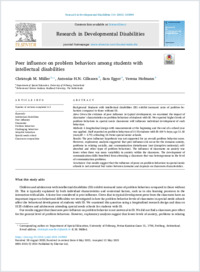Peer influence on problem behaviors among students with intellectual disabilities
IPC
- Müller, Christoph Michael ORCID Department of Special Education, University of Fribourg, Switzerland
- Cillessen, Antonius H. N. ORCID Behavioural Science Institute, Radboud University, The Netherlands
- Egger, Sara ORCID Department of Special Education, University of Fribourg, Switzerland
- Hofmann, Verena Department of Special Education, University of Fribourg, Switzerland
- 2021
Published in:
- Research in Developmental Disabilities. - 2021, vol. 114, p. 103994
Intellectual disabilities
Peer infuence
Classmates
Problem behaviors
Challenging behaviors
Adaptive behaviors
Special needs school
Classroom composition
English
Background: Students with intellectual disabilities (ID) exhibit increased rates of problem behaviors compared to those without ID. Aims: Given the evidence of peer infuence in typical development, we examined the impact of classmates’ characteristics on problem behaviors of students with ID. We expected higher levels of problem behaviors in special needs classrooms will influence individual development of such behaviors. Methods: A longitudinal design with measurements at the beginning and the end of a school year was applied. Staff reported on problem behaviors of 1125 students with ID (69 % boys; age 11.30 years,SD = 3.75) 3.75) attending 16 Swiss special needs schools. Results: The peer influence hypothesis was not supported for an overall problem behavior score. However, exploratory analyses suggested that peer infuence did occur for the domains anxiety, problems in relating socially, and communication disturbances (not disruptive/antisocial, self- absorbed and other types of problem behaviors). The influence of classmates on anxiety was lower when there was more variability in anxiety within the classroom. The development of communication skills benefitted from attending a classroom that was heterogeneous in the level of communication problems. Conclusion: Our results suggest that the influence of peers on problem behaviors in special needs schools is not universal but varies between domains and depends on classroom characteristics.
- Faculty
- Faculté des lettres et des sciences humaines
- Department
- Département de Pédagogie spécialisée
- Language
-
- English
- Classification
- Special education
- Other electronic version
- License
- Open access status
- green
- Identifiers
- Persistent URL
- https://folia.unifr.ch/unifr/documents/320006
Statistics
Document views: 92
File downloads:
- mueller_et_al_2021_peer: 216
